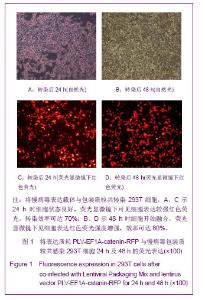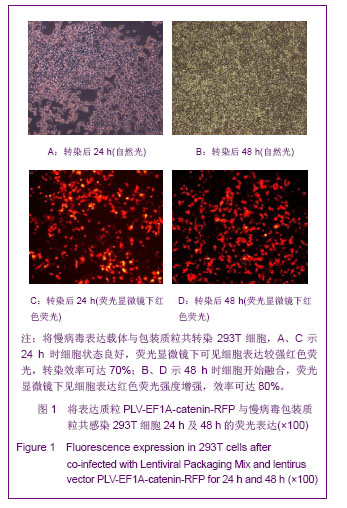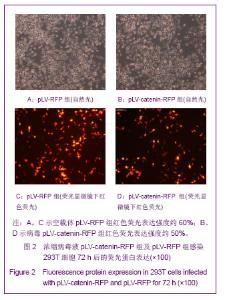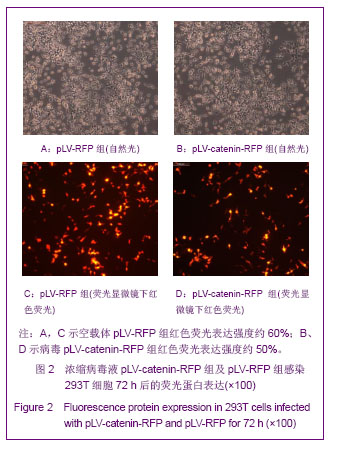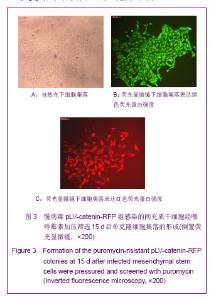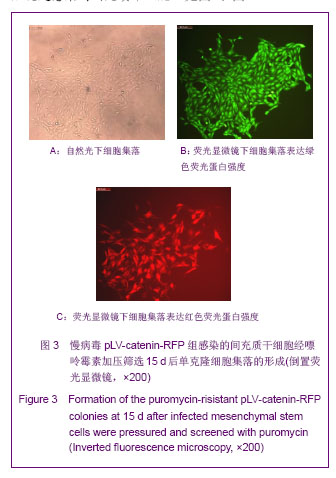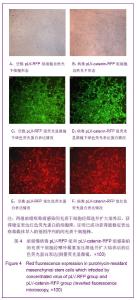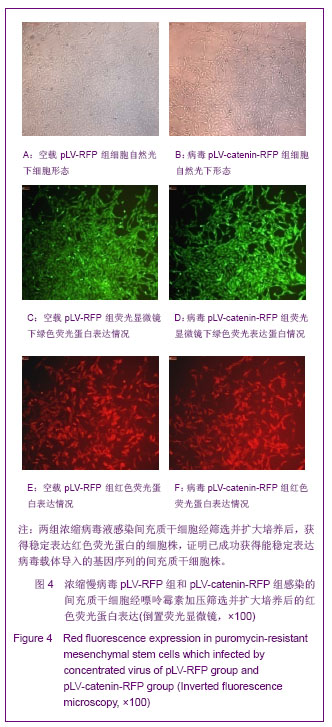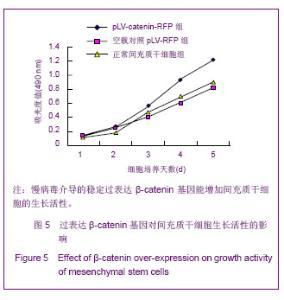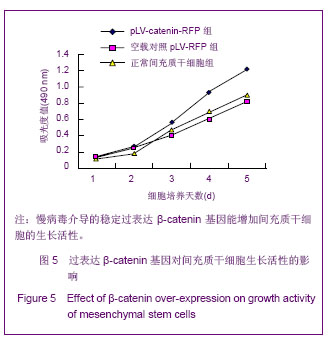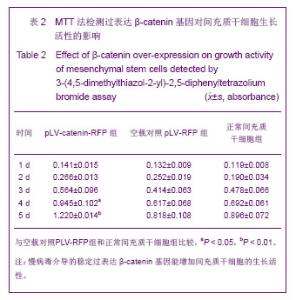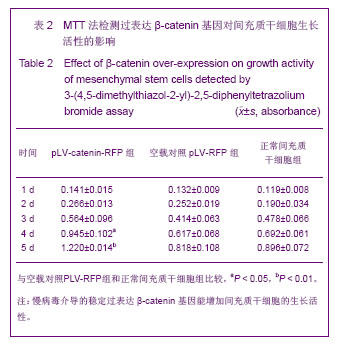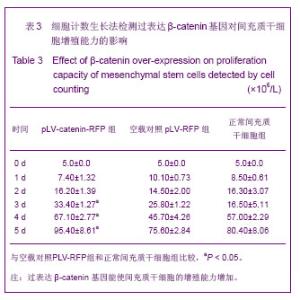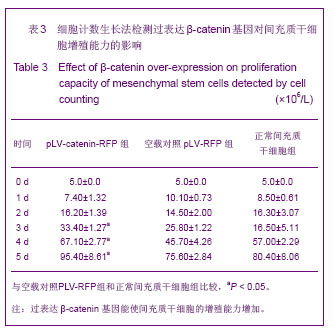Chinese Journal of Tissue Engineering Research ›› 2013, Vol. 17 ›› Issue (40): 7076-7083.doi: 10.3969/j.issn.2095-4344.2013.40.009
Previous Articles Next Articles
Lentivirus-mediated over-expression of beta-catenin accelerates proliferation and migration of mesenchymal stem cells
Wu Qian1, Wei Ya-ming2, Li Yu-yuan1, Nie Yu-qiang1, Cao Yan-wen1
- 1 Department of Gastroenterology, Guangzhou First People’s Hospital, Guangzhou Medical University, Guangzhou 510180, Guangdong Province, China; 2 Department of Blood Transfusion, Guangzhou First People’s Hospital, Guangzhou Medical University, Guangzhou 510180, Guangdong Province, China
-
Online:2013-10-01Published:2013-10-31 -
Contact:Wei Ya-ming, Professor, Department of Blood Transfusion, Guangzhou First People’s Hospital, Guangzhou Medical University, Guangzhou 510180, Guangdong Province, China weiyaming@163.com -
About author:Wu Qian★, Studying for master’s degree, Department of Gastroenterology, Guangzhou First People’s Hospital, Guangzhou Medical University, Guangzhou 510180, Guangdong Province, China qianwu1986@sina.com -
Supported by:the National Natural Science Foundation of China, No. 81070385*; the Scientific Research Foundation for the Returned Overseas Chinese Scholars, No. [2012]940*; the Major Livehood Special Fund of Guangzhou City, No. 201300000100*
CLC Number:
Cite this article
Wu Qian, Wei Ya-ming, Li Yu-yuan, Nie Yu-qiang, Cao Yan-wen. Lentivirus-mediated over-expression of beta-catenin accelerates proliferation and migration of mesenchymal stem cells[J]. Chinese Journal of Tissue Engineering Research, 2013, 17(40): 7076-7083.
share this article
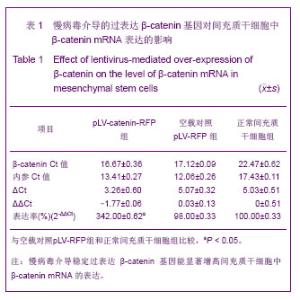
由图3可见,将pLV-catenin-RFP组和pLV-RFP组的病毒浓缩液感染携带绿色荧光GFP标记的间充质干细胞,72 h后倒置荧光显微镜下观察,pLV-catenin-RFP组感染效率约为50%,pLV-RFP组约为60%。进行嘌呤霉素加压筛选,15 d左右形成稳定表达红色荧光蛋白的单克隆集落。由图4可见,挑取单克隆后扩大培养10代后,细胞稳定表达红色荧光蛋白95%以上。表明稳定过表达β-catenin基因的间充质干细胞株建立,该细胞株同时携带绿色荧光GFP和红色荧光RFP标记。 2.3 过表达β-catenin基因增加间充质干细胞β-catenin mRNA水平的表达 荧光定量PCR实验结果显示,pLV-catenin-RFP组稳定过表达间充质干细胞中,β-catenin mRNA的表达率较空载对照pLV-RFP组、正常间充质干细胞组显著增高(P < 0.05)。而空载对照pLV-RFP组和正常间充质干细胞组之间β-catenin mRNA表达率差异无显著性意义(P > 0.05)。结果表明,以慢病毒介导的稳定过表达β-catenin基因能显著增高间充质干细胞中β-catenin mRNA的表达,见表1。"
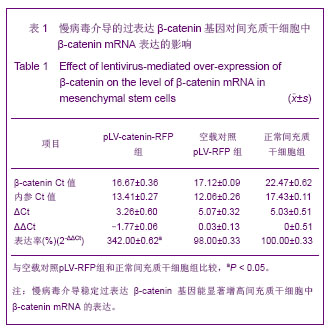
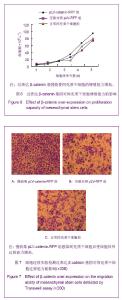
分别取各组3 d和5 d单位细胞数,计算细胞的倍增时间,结果显示病毒pLV-catenin-RFP组较空载对照pLV-RFP组[(25.03±1.57) h vs.(27.72±0.93) h]和正常间充质干细胞组[(25.03±1.57) h vs. (32.62±2.86) h]有明显缩短,且差异有显著性意义(P < 0.05)。结果表明,过表达β-catenin基因能增加间充质干细胞的增殖能力,见图6。 2.6 过表达β-catenin基因增加间充质干细胞的迁移能力 慢病毒pLV-catenin-RFP组间充质干细胞穿过微孔膜的数目较空载对照pLV-RFP组(605±26,172±12)、正常间充质干细胞组(605±26,184±17)显著升高 (P < 0.01),而空载对照pLV-RFP组与正常间充质干细胞组(172±12,184±17)比差异无显著性意义(P > 0.05)。结果说明,靶向过表达β-catenin基因能增加间充质干细胞的迁移能力,见图7。"
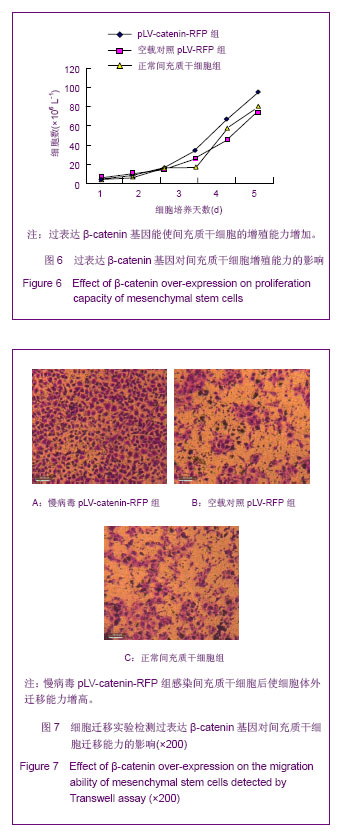
| [1]Latella G, Fiocchi C, Caprili R. News from the "5th International Meeting on Inflammatory Bowel Diseases" CAPRI 2010.J Crohns Colitis. 2010;4(6):690-702. [2]Dalal J, Gandy K, Domen J. Role of mesenchymal stem cell therapy in Crohn’s disease. Pediatr Res. 2012;71(4 Pt 2): 445-451. [3]Manieri NA, Stappenbeck TS. Mesenchymal stem cell therapy of intestinal disease: are their effects systemic or localized. Curr Opin Gastroenterol. 2011;27(2):119-124. [4]魏亚明,聂玉强,李瑜元,等.炎症性肠病及其干细胞移植再生修复[J].世界华人消化杂志,2006,14(13):1314-1317. [5]Wei Y, Nie Y, Lai J,et al. Comparison of the population capacity of hematopoietic and mesenchymal stem cells in experimental colitis rat model.Transplantation. 2009;88(1): 42-48. [6]Okamoto R, Watanabe M. Molecular and clinical basis for the regeneration of human gastrointestinal epithelia.J Gastroenterol. 2004;39(1):1-6. [7]Okamoto R, Watanabe M. Cellular and molecular mechanisms of the epithelial repair in IBD. Dig Dis Sci. 2005; 50 Suppl 1:S34-38. [8]van Amerongen R, Berns A. Knockout mouse models to study Wnt signal transduction. Trends Genet. 2006;22(12):678-689. [9]Gough NR. Focus issue: Wnt and β-catenin signaling in development and disease.Sci Signal. 2012;5(206):eg2. [10]Duan Y, Fan M.Lentivirus-mediated gene silencing of beta-catenin inhibits growth of human tongue cancer cells.J Oral Pathol Med. 2011;40(8):643-650. [11]Liu N, Shi S, Deng M,et al. High levels of β-catenin signaling reduce osteogenic differentiation of stem cells in inflammatory microenvironments through inhibition of the noncanonical Wnt pathway.J Bone Miner Res. 2011;26(9):2082-2095. [12]Katoh M, Katoh M.WNT signaling pathway and stem cell signaling network.Clin Cancer Res. 2007;13(14):4042-4045. [13]胡政,蔡芳,程莉娟,等.逆转录病毒载体介导的 RNAi技术稳定抑制前列腺癌细胞株β-catenin的表达[J].中南大学学报:医学版, 2005,30(3):253-257. [14]Wang QM, Zhang Y, Yang KM, et al. Wnt/beta-catenin signaling pathway is active in pancreatic development of rat embryo.World J Gastroenterol. 2006 Apr 28;12(16):2615- 2619. [15]Strober W, Fuss I, Mannon P. The fundamental basis of inflammatory bowel disease. J Clin Invest. 2007;117(3): 514-521. [16]García-Bosch O, Ricart E. Panés J.Review article: stem cell therapies for inflammatory bowel disease - efficacy and safety.Aliment Pharmacol Ther. 2010;32(8):939-952. [17]Le Blanc K, Rasmusson I, Sundberg B,et al. Treatment of severe acute graft-versus-host disease with third party haploidentical mesenchymal stem cells.Lancet. 2004;363 (9419): 1439-1441. [18]García-Olmo D, García-Arranz M, Herreros D,et al. A phase I clinical trial of the treatment of Crohn's fistula by adipose mesenchymal stem cell transplantation.Dis Colon Rectum. 2005;48(7):1416-1423. [19]Le Blanc K, Frassoni F, Ball L,et al. Mesenchymal stem cells for treatment of steroid-resistant, severe, acute graft-versus-host disease: a phase II study.Lancet. 2008;371 (9624):1579-1586. [20]Ricart E.Current status of mesenchymal stem cell therapy and bone marrow transplantation in IBD.Dig Dis. 2012;30(4): 387-391. [21]van der Marel S, Majowicz A, van Deventer S,et al. Gene and cell therapy based treatment strategies for inflammatory bowel diseases.World J Gastrointest Pathophysiol. 2011;2(6): 114-122. [22]Ciccocioppo R, Bernardo ME, Sgarella A,et al. Autologous bone marrow-derived mesenchymal stromal cells in the treatment of fistulising Crohn's disease.Gut. 2011;60(6): 788-798. [23]段进粮,聂玉强,李瑜元,等.大鼠骨髓间充质干细胞移植后在溃疡性结肠炎模型肠道的定位[J].广州医学院学报,2006,34(1):1-4. [24]Gonzalez-Rey E, Anderson P, González MA,et al. Human adult stem cells derived from adipose tissue protect against experimental colitis and sepsis.Gut. 2009;58(7):929-939. [25]Sémont A, Mouiseddine M, François A,et al. Mesenchymal stem cells improve small intestinal integrity through regulation of endogenous epithelial cell homeostasis.Cell Death Differ. 2010;17(6):952-961. [26]陈倩倩,万军,阎丽,等. 小鼠骨髓间充质干细胞移植后在炎症性肠病模型的定位[J].军医进修学院学报,2012,33(6):638-641. [27]汪维伟,徐艳华,姜蓉,等. 骨髓间充质干细胞移植治疗大鼠溃疡性结肠炎[J]. 中国组织工程研究, 2012, 16(32): 6025-6031. [28]宋祥福,孙冰雪,张静春,等.同种异体大鼠骨髓间充质干细胞移植对放射性空肠损伤的修复作用[J].中国比较医学杂志,2011, 21(8): 63-65. [29]Rubinson DA, Dillon CP, Kwiatkowski AV,et al. A lentivirus-based system to functionally silence genes in primary mammalian cells, stem cells and transgenic mice by RNA interference. Nat Genet. 2003;33(3):401-406. |
| [1] | Wang Jing, Xiong Shan, Cao Jin, Feng Linwei, Wang Xin. Role and mechanism of interleukin-3 in bone metabolism [J]. Chinese Journal of Tissue Engineering Research, 2022, 26(8): 1260-1265. |
| [2] | Xiao Hao, Liu Jing, Zhou Jun. Research progress of pulsed electromagnetic field in the treatment of postmenopausal osteoporosis [J]. Chinese Journal of Tissue Engineering Research, 2022, 26(8): 1266-1271. |
| [3] | Hou Jingying, Guo Tianzhu, Yu Menglei, Long Huibao, Wu Hao. Hypoxia preconditioning targets and downregulates miR-195 and promotes bone marrow mesenchymal stem cell survival and pro-angiogenic potential by activating MALAT1 [J]. Chinese Journal of Tissue Engineering Research, 2022, 26(7): 1005-1011. |
| [4] | Liang Xuezhen, Yang Xi, Li Jiacheng, Luo Di, Xu Bo, Li Gang. Bushen Huoxue capsule regulates osteogenic and adipogenic differentiation of rat bone marrow mesenchymal stem cells via Hedgehog signaling pathway [J]. Chinese Journal of Tissue Engineering Research, 2022, 26(7): 1020-1026. |
| [5] | Wen Dandan, Li Qiang, Shen Caiqi, Ji Zhe, Jin Peisheng. Nocardia rubra cell wall skeleton for extemal use improves the viability of adipogenic mesenchymal stem cells and promotes diabetes wound repair [J]. Chinese Journal of Tissue Engineering Research, 2022, 26(7): 1038-1044. |
| [6] | Zhu Bingbing, Deng Jianghua, Chen Jingjing, Mu Xiaoling. Interleukin-8 receptor enhances the migration and adhesion of umbilical cord mesenchymal stem cells to injured endothelium [J]. Chinese Journal of Tissue Engineering Research, 2022, 26(7): 1045-1050. |
| [7] | Fang Xiaolei, Leng Jun, Zhang Chen, Liu Huimin, Guo Wen. Systematic evaluation of different therapeutic effects of mesenchymal stem cell transplantation in the treatment of ischemic stroke [J]. Chinese Journal of Tissue Engineering Research, 2022, 26(7): 1085-1092. |
| [8] | Guo Jia, Ding Qionghua, Liu Ze, Lü Siyi, Zhou Quancheng, Gao Yuhua, Bai Chunyu. Biological characteristics and immunoregulation of exosomes derived from mesenchymal stem cells [J]. Chinese Journal of Tissue Engineering Research, 2022, 26(7): 1093-1101. |
| [9] | Zhang Jinglin, Leng Min, Zhu Boheng, Wang Hong. Mechanism and application of stem cell-derived exosomes in promoting diabetic wound healing [J]. Chinese Journal of Tissue Engineering Research, 2022, 26(7): 1113-1118. |
| [10] | Tian Chuan, Zhu Xiangqing, Yang Zailing, Yan Donghai, Li Ye, Wang Yanying, Yang Yukun, He Jie, Lü Guanke, Cai Xuemin, Shu Liping, He Zhixu, Pan Xinghua. Bone marrow mesenchymal stem cells regulate ovarian aging in macaques [J]. Chinese Journal of Tissue Engineering Research, 2022, 26(7): 985-991. |
| [11] | Kang Kunlong, Wang Xintao. Research hotspot of biological scaffold materials promoting osteogenic differentiation of bone marrow mesenchymal stem cells [J]. Chinese Journal of Tissue Engineering Research, 2022, 26(4): 597-603. |
| [12] | Huang Chuanjun, Zou Yu, Zhou Xiaoting, Zhu Yangqing, Qian Wei, Zhang Wei, Liu Xing. Transplantation of umbilical cord mesenchymal stem cells encapsulated in RADA16-BDNF hydrogel promotes neurological recovery in an intracerebral hemorrhage rat model [J]. Chinese Journal of Tissue Engineering Research, 2022, 26(4): 510-515. |
| [13] | Yang Sidi, Wang Qian, Xu Nuo, Wang Ronghan, Jin Chuanqi, Lu Ying, Dong Ming. Biodentine enhances the proliferation and differentiation of osteoblasts through upregulating bone morphogenetic protein-2 [J]. Chinese Journal of Tissue Engineering Research, 2022, 26(4): 516-520. |
| [14] | Feng Dongfei, He Hongxu, Xie Qi, Zhang Lili, Zhou Hui, Li Wei. Selection of key genes related to biological functions and regulation pathway in periodontal reconstruction [J]. Chinese Journal of Tissue Engineering Research, 2022, 26(2): 253-259. |
| [15] | Cao Wei, Mao Furong, Hu Xiaohua, Yang Xiaohong. N-6 methyladenosine RNA methylation regulates osteogenic and adipogenic differentiation of bone marrow mesenchymal stem cells [J]. Chinese Journal of Tissue Engineering Research, 2022, 26(2): 266-270. |
| Viewed | ||||||
|
Full text |
|
|||||
|
Abstract |
|
|||||
